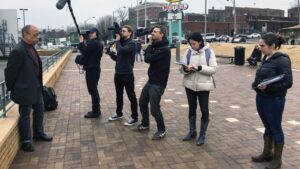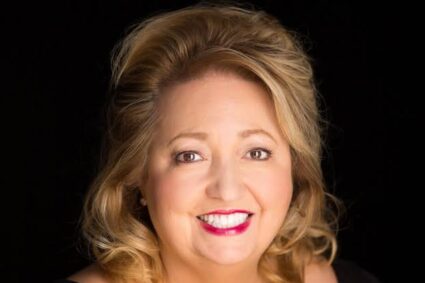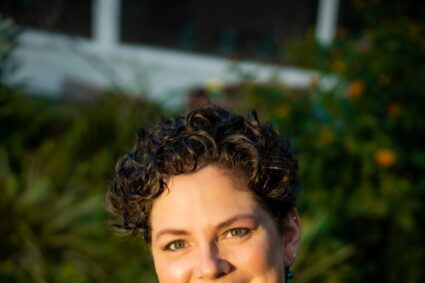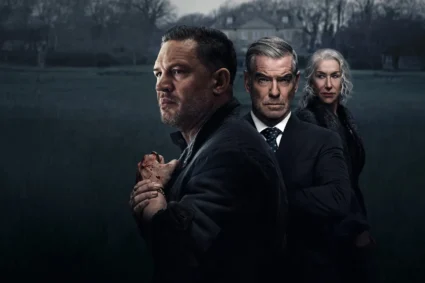
On this edition of THE INTERVUE, we will get to confront history head on in the new powerful documentary Who We Are: A Chronicle of Racism in America. Interweaving lecture, personal anecdotes, interviews, and revelations, ACLU deputy legal director Jeffery Robinson draws a stark timeline of anti-Black racism in the United States, from slavery to modern America.
I recently sat down with our guide on the journey Jeffrey Robinson and the co-directing team of Emily & Sarah Kunstler to discuss this documentary that is a must see for today’s audiences.
My first question is to you, Emily, and Sarah. And first question I want to ask is, How did you come up with the process of telling this wonderful narrative? And how did you bring Jeffrey involved with the process?
Sarah Kunstler (SK): Well, we didn’t come up with I mean, you mean, how did we come up with the concept for the film? I mean, this is all Geoffrey, this is 100%. Jeffrey, you know, this is something that a project the Jeffrey’s been working on for, for 10 years, for 10 years before we met him. So that was all of the work, the research, the pre-production, the concept, in terms of how we came up with what to stick around Jeffrey’s talk? Maybe, Emily, you could speak about that?
Emily Kunstler (EK): Sure, that was a very organic process. The only thing we knew right away was that we wanted to record a beautiful version of Jeffrey’s presentation. That was we knew we’d have to do that. That was something we could hit the ground running, trying to produce. So that’s what we did first. And once we had that, we just we decided to travel around the country with Jeffrey as he gave this presentation. I mean, we didn’t, we didn’t have a lot of money to make this film.
So, tagging along with Jeffrey as he was being flown by his kids by then his company, the ACLU to different locations, we were like, well okay, that’s one hotel and flight ticket, we don’t have to cover so we’ll go along with him. And wherever we would go, we would, we would find people in those communities that would bring stories from Jeffrey’s presentation to life that would bring these personal narratives that could really connect with audiences into the mix, including Jeffrey’s own personal narrative.
So, we really figured this out as we went. And each time we’d interview someone, every place we’d go, we’d all turn to each other and say, “Oh my God, that was the most amazing trip, that was the best interview.” We knew we were getting these amazing components. We only started realizing how it was all going to come together once we started editing. And, and I feel quite fortunate that the pieces that we got worked so well, with Jeff’s presentation, that the finished piece, you know, sort of almost effortlessly, effortlessly goes from the stage to into these scenes outside of the theater.
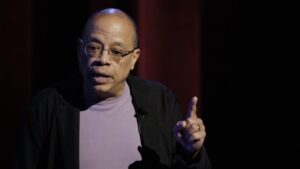
Jeffrey, let me tell you straight up, I wish I had you as my history teacher in college because I felt for almost two hours that this was a brilliant history lesson. I was moved, I was intrigued. I was drawn in from the first moment to the last. My question to you is you had a quote that really hit home. You mentioned that “Racism equals prejudice, plus social power plus legal authority, and black and brown people never had the last two since we were bought here.” And I want you to tell the audience about that particular quote because it really hit home, especially for people of color, African Americans like us.
Jeffrey Robinson (JR): I think people often confuse racism and prejudice; they are not the same thing. I can be the most prejudiced person in any room I walk into in this country, but I can’t be a racist in this country, because racism takes prejudice and elevates it to a different place. It adds on the social power about how you walk through the community. It adds on the legal authority so that the government is making laws taking positions and enacting policies that are advantages to one group and disadvantageous to another group. And so, we see examples of that when the Homestead Act was passed, and over 80 million acres of land was given to white settlers for free and basically for free, and you know, King talked about it saying this is an example of the government willing to undergird its white European peasants with an economic floor.
And at the very same time that land was being given land was being refused to newly freed enslaved black people. So, there are all these examples throughout history that show you that racism is something more than prejudice. And so, when people say, “Oh, that black person is being a racist,” or I heard the last President talk about January 6th investigators as racist, and it’s just a joke, it’s an attempt to minimize the definition of racism. And it’s an attempt to draw equivalence between a white person who has experienced someone being prejudiced against them. And a black person in America experience race experiencing racism, the two things are not even close.
You’re right about that. My next question is for all three of you now that I’m thinking about it, that one of the moments that really teared me up and that’s when you interviewed Lessie Benningfield Randall, the oldest living survivor of the 1921 Tulsa Massacre. Tell us what it feels like to talk to someone who lived through that massacre which was 101 years ago. And how did this interview came to be?
JR: I will say for me that talking to her was like talking to my great grandmother. Because, you know, I and I haven’t you have we have seen elders in our community who look like her who have the same kind of spry mind that she had. And it was just it was, it was such a gift. And, you know, as we’re getting ready to film, we have her like with plastic all over her house to protect her because this was filmed in the middle of the pandemic. And we had been to Tulsa twice, to try and talk with her. And she had been sick both times. And we just thought, you know, this isn’t gonna work out. But the activists and people who are working for racial justice in Tulsa, are very protective of her.
And you know, when we first were getting, we’re going there the first time, they were like, we’ll see maybe she’s around, maybe she’s not. And I think they came to trust what we were doing. And that’s why Mother Randall became available to us and at 106 years old when she said, I’m 100 (mumble) years. Yeah, and just the look on her face. She was thrilled with it. I couldn’t stop laughing. I mean, she just like, touched my heart when she was doing that. And this woman went from there to describing what she saw as a child. And some of those memories are chilling, when she’s talking about it looked like they were sleeping in the street “And I thought why they are sleeping, and they weren’t sleeping, they were dead. “And so her survival is a victory in and of itself. And the fact that she is 106 years old.
I think the city of Tulsa just recently did something to give her a little bit of some financial benefit for to ease the rest of her life. I just think that is so sad that the city can’t recognize what happened to her and her community and they still have to minimize it and deny it and her credibility and her character.
I wish I can end the interview with that moment but thank you for sharing this story. Emily and Sarah, how was the collaborative decision made to also include some personal stories from Jeffrey’s childhood, especially we got to see where he grew up in Memphis, the school that he went to?
EK: Well, just a storyteller. So, he incorporated some summaries of you know, touched on a little bit of this in this presentation sort of danced around his story, but never really went into it in any depth. But we were we were immediately to really curious about his own experience. And we knew Jeffrey being the heart of this film, that incorporating his story was crucial. audiences. I mean, Jeffrey is such a welcome welcoming, engaging, you know, presenter, but audiences would be curious, who is this person? Where did he come from?
By showing these stories and inviting people in, you know, we gave people you know, the permission to show their own vulnerabilities, as Jeff was showing his. I really think that that’s important in connecting with audiences. So, you know, it was a discussion, Jeff can speak about this too. But initially, you know, he was a little red reticent about it. He didn’t want the film to be about him, you know, and we understood that, you know, and the film ultimately isn’t about him, but he’s a big part of it. But it was just, it was through the growth of our relationships and our and our mutual trust. And we got to a point where Jeff was willing to turn the camera on himself.
JR: Absolutely, I think I get remember the word Emily used about my attitude, reticent, but I think that’s a gentle word, because I didn’t want any part of it. I was telling them, I’m not gonna be in this film. It’s not about me. It’s about it’s about the history. I think Emily got it, right. We just grew to trust each other and kept talking to each other. And for me, I think I finally figured if you know, Tiffany Crutcher, and Gwen Carr can sit in front of a camera and talk about loved ones being slaughtered, then I could sit in front of a camera and talk about going to a school or by family by you.
I am glad that you included the stories, even the sister of Larry Payne, who was in the march with you and unfortunate was killed during the march, just three weeks before MLK was shot. And it was very sad. It’s very sad. I’m glad to include that in the narrative.
JR: Emily, I thought that was really important about including Larry Payne and his family in this narrative. And his murder is not something that was broadcast around the country. It didn’t “go viral” because there was no “going viral” in 1968. I think, you know, the universe does strange thing. He was killed April 28, 1968. April 28, 2021 was the day before jury selection in the Derek Chauvin case in Minneapolis. It’s just interesting how the universe kind of aligns things.
My last question is to all three of you. What’s the message you have for people out there for having this raw conversation of what happened out there for the past 250 years to what can we do to move forward?
SK: I think the three of us strongly feel that what is needed in order to move that ball forward is knowledge information is the recovering of this forgotten or really hidden history. We can’t even figure out what next steps are the right steps to take without kind of without understanding this chronology without having the unbroken line from 1619. Today, that is our history and that has been taken from us.
Once we have a collective understanding, a collective reckoning, a reframed narrative and shared set of facts to operate from, then we can figure out where to go together. We were together last night and a during a Q & A session, and I said that right now, it kind of feels like we’re in a science fiction story, where our history has been stolen from us. And there’s some people what, we’re a science experiment, really, and there’s people watching us from the outside saying, how are these people going to live? What are they going to do without their history? You know, how are they going to repeat the same mistakes and, and, you know, what misjudgments and errors are they going to make without If we take their past away from them, and it is it, it’s like living in a science experiment without our own past. But I think that once that if that if we can work towards recovering that together, then the next steps we take but will be clear to all of us.
JR: I think I just want to add that I left the ACLU in March of last year. I love that job and the work, but I left it to start the Who We Are Project. Our goal is to be a key player in changing the narrative about America’s history of anti-black racism. And if we, as Sarah said, change that narrative and deal with the truth, we will get different answers to the question “Why does America look like it does today?” And if we have those different answers that are actually accurate, we can then design solutions that will deal with the problems that we’ve identified, as opposed to designing solutions that won’t deal with those problems.
People say pass an anti-choking law, and that will solve the George Floyd problem. Well, it won’t, because that’s not the problem. They could have jumped in, beat him shot him, it doesn’t matter. The problem is why do police feel free to use that kind of violence against people that look like me and look like you? And so, by asking the right questions, we can get to the right answers, but the right questions require knowing what our history is.
Who We Are: A Chronicle of Racism in America is running in select DC theatres TODAY February 4 here and in select theatres in Baltimore February 11th.
